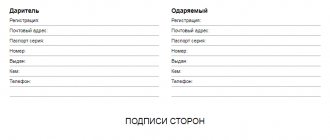A gift agreement, according to Article 572 of the Civil Code of the Russian Federation (Civil Code of the Russian Federation), is a type of transaction in which a gift is free of charge . The parties to the agreement are the donor and the donee (recipient of the gift). The subject of the gift is rights, things and the release of the donee from property obligations.
The contract is concluded in written or oral form in accordance with Art. 574 Civil Code of the Russian Federation. Oral form is not allowed when promising a gift in the future. The contract must necessarily include the essential conditions specified in the current regulations. These include a description of the item being donated. If these conditions are not specified, the contract is considered void (having no legal force).
The term for the execution of the contract is not one of the essential conditions and may not be indicated in the document.
Concept and parties to the gift agreement
The donation of rights, things or the release of the donee from obligations is carried out free of charge . According to Art. 572 of the Civil Code of the Russian Federation, if the fact of a counter transfer (from the donee to the donor) of goods or services was discovered, the agreement is not considered a donation. The rules of Art. 170 Civil Code of the Russian Federation.
The donor has the right to assume the obligations of the donee to pay debts or provide him with the right of claim in relation to himself or third parties. restrictions apply to the gift agreement :
- a promise to make a gift in the future is recognized as a gift agreement only if it is drawn up in accordance with the rules of paragraph 2 of Art. 574 Civil Code of the Russian Federation;
- it is unacceptable to promise to donate all or part of the property without indicating specific items of donation;
- An agreement according to which the object of donation could be transferred to the donee only after the death of the donor is recognized as void. At the same time, the donor's heirs receive the obligation to transfer the gift, which the testator did not manage to fulfill during his lifetime. It is permissible to include in the contract a clause according to which, after the death of the donor, his heirs are exempt from the need to make a gift.
The gift agreement is multilateral and cannot be concluded by one person.
Deed of gift for a residential building or part thereof
According to the legislation in force in the Russian Federation, residential property can be transferred by its owner to another person in whole or in parts. In jurisprudence, there are examples of donative shares of a residential building, as well as donation agreements for undivided property. In case of transfer of part of the house, certain conditions must be met:
- Make a separate kitchen and bathroom;
- arrange a separate entrance to the donated part of the house;
- provide separate communications, etc.
In addition, when separating part of such a property, the donor will need to undergo an appropriate examination at the BTI, whose specialists must provide an extract containing:
- Determining the possibility or impossibility of dividing the living space.
- Options for this section.
- Estimated cost, as well as a technical plan for redevelopment in case of division.
- Date of construction of the building.
- Plan of the entire housing.
- The actual amount of compensation for the party who received the smaller share (if it is impossible to divide the area into equal shares).
At the same time, in the donation agreement for a part of the house, the donor simply indicates certain rooms that will be donated to the recipient.
Form of gift agreement
Provisions of Art. 574 of the Civil Code of the Russian Federation determines the form of the gift agreement. It can be written and oral . In cases where a transaction can be concluded orally, by agreement of the parties, the agreement can also be drawn up in writing. It is permissible to draw up a document yourself or by contacting a notary with subsequent notarization of the agreement.
The written form must be used if:
- an organization acts as a donor, and the value of the object of donation (things, rights or services) exceeds three thousand rubles;
- The donor has promised to make a donation in the future, and a specific item of donation is specified.
The gift is transferred by direct delivery to the donee, transfer of title documents or symbolic delivery (for example, keys to an apartment). If real estate that requires state registration is donated, the transfer of ownership from the donor to the donee must be registered. The document itself does not need to be registered from March 1, 2013 .
Features of a deed of gift for a plot for a residential building
A deed of gift for a house between close relatives and strangers must be drawn up in triplicate. The presence of a notary is not mandatory, but an advisory factor that will act as a guarantor of the absence of claims from both parties in the future.
At the same time, in order for the gift agreement to have legal force, it must comply with the rules and regulations established by Russian legislation:
- The act must contain all important information about the building and the land on which it is built.
- Information from the parties' passports must be entered without blots or errors.
- The donee is obliged to express his consent to accept property from the donor.
- The agreement must define the conditions and timing of its entry into force.
- The content must indicate the actual cost of the house and land being transferred.
ARTICLE RECOMMENDED FOR YOU:
Donation as a gift for generally beneficial purposes
Essential terms of the gift agreement
Article 432 of the Civil Code of the Russian Federation defines the main provisions for concluding an agreement. According to paragraph 1 of this article, the contract must include essential terms . These include conditions that are mandatory for the conclusion of a contract and defined in laws and other regulations. Each type of contract may include different essential terms.
For a gift agreement, an essential condition is information about the subject of the agreement . If they are not indicated, the agreement is considered to have no legal force. The characteristic features of the thing or the features of the rights that are the subject of the donation are described. If there are any shortcomings, they are also indicated .
Important
The term of the contract does not relate to the essential conditions, therefore the contract can be drawn up without specifying the period for the transfer of the gift.
From Art. 432 of the Civil Code of the Russian Federation it follows that an agreement can be concluded only after an agreement has been reached between the parties regarding each of the points contained in the document. Not only essential conditions are specified, but also additional and incidental ones (if any).
Pros and cons of registering a deed of gift for a house
Like any other legal transaction, a gift agreement, depending on the situation, contains both positive and negative sides. And only after studying all of them, experts recommend that citizens decide whether this real estate transaction is suitable for them or whether it would be better to use another method of transferring it to another person.
Lawyers include the main advantages of deeds of gift::
- There is no obligation to certify the authenticity of documents involved in a transaction with a notary.
- Determination of the conditions and timing of the transfer of the gift into ownership.
- No gift taxation for transactions between relatives.
- The fact that the donee becomes the legal owner of the property immediately after registration of ownership.
- After the official registration of the transaction, the new owner of the property has the right to dispose of it at his own discretion.
- Real estate can be donated during the donor's lifetime, which sometimes avoids conflicts between heirs that often arise when making a will.
- A house received by deed of gift is not part of the jointly acquired property, and therefore will not be divided during a divorce.
ARTICLE RECOMMENDED FOR YOU:
Limitation period for challenging donation transactions
As a rule, the disadvantages of the deal include::
- An incorrectly drawn up document can be easily challenged in court.
- A gift of a house, unlike, for example, a will, cannot be changed in favor of another person.
- Transactions in which parties are not relatives (strangers and persons not included in this category by law) are subject to income tax, the amount of which in 2021 is 13% of the total value of the transaction.
- Also, there is a list of persons who cannot act as recipients. But, more on that later.
Deadline for donation
In addition to the mandatory (essential) terms of the contract, there are additional conditions . They may not be included in the document without affecting the recognition of its legality.
The timing of the transfer of the gift is subject to additional conditions. If it is specified in the contract, then the donation must be made within this time. In other cases, a date is determined when the gift must be transferred.
An agreement in which the period for transferring the gift is not specified is considered real . This means that the donation must be made immediately after the document is signed. An agreement made orally is also considered real, since the promise of a gift in the future is unacceptable.
Structure and content of the document
There is no single legally established form of gift agreement. But there are general requirements for the content of the document that are worth considering.
Thus, a contract for the donation of a house and land must be in writing , otherwise it will be considered invalid. A deed of gift for a house assumes the unconditional nature of the contract.
If it indicates that the donor has received compensation for the transfer of property rights (in the form of cash, certain services or other property), then the transaction is reclassified from a gift to a purchase and sale agreement.
A contract may be real or consensual. In the latter case, we are talking about the party’s intention to donate property in the future.
When concluding a gift agreement, it is recommended to include the following points in the document:
- In the header of the document, you must indicate the type of agreement (donation agreement), the date and place of its conclusion.
- Parties to the transaction: full name of the donor and recipient; confirmation of the fact that they are of sound mind and are aware of their actions.
- The deed of gift must contain an indication of the subject of the agreement and its detailed description: cadastral number of the plot and building, address of their location, occupied area, number of floors, number of rooms.
- The cadastral value of the transferred objects (in the future it will serve as the tax base).
- Obligations of the parties to donate the plot and the house on it free of charge.
- Rights and obligations of the parties.
- Information about title documents for real estate.
- Encumbrances and restrictions. It is necessary to register the absence of encumbrances on the land and house.
- Information about the presence of other owners and their consent to the transaction.
- The procedure for resolving controversial issues.
- Signatures of the parties.
- Applications.
A sample of a donation agreement for a residential building with a plot of land is available for free here.
The conclusion of land and house donation agreements follows general rules, but there are some nuances associated with the property itself.
Thus, when transferring a share in a private building, it must be allocated in kind.
This means that an independent part of the home can be created with a separate entrance, communications, bathroom, etc. A construction and technical examination must be carried out to confirm the possibility of transferring a share in the house.
Deadline for registering the transfer of ownership by way of gift
Real estate donated to an individual or legal entity is subject to state registration . The donee needs to obtain a certificate of ownership of it - only after that he will be able to fully dispose of the property. Movable property subject to state registration must also be registered within the period specified for this type of property.
Registration of the transfer of ownership is carried out by the Federal Registration Service of Cadastre and Cartography. Documents are prepared within 10 working days from the date of their submission . You can submit a package of documents through the local branch of Rosreestr or a multifunctional center. a state fee must be paid in the amount specified in Art. 333.33 of the Tax Code of the Russian Federation (TC RF).
In accordance with Art. 2 of the Federal Law of July 21, 1997 N 122-FZ “On state registration of rights to real estate and transactions with it”, the date of state registration will be considered the date of making the corresponding entry in the state register.
Example
In 2014, citizen Fedorov gave an apartment to his second cousin, citizen Ivanov. The gift agreement was drawn up in writing and signed by the parties to the transaction. A standard form was taken as the basis for drawing up the document, since notarization of the gift agreement is not necessary in this case. The agreement contained the data of the parties, a description of the gift (apartment) and the period during which it should be transferred. After receiving the apartment, Ivanov paid the state fee, the amount of which at that time was one thousand rubles, and submitted documents to register the transfer of ownership. After 10 working days, citizen Ivanov received a certificate of ownership, giving him the right to dispose of the received property.
What is a deed of gift in 2021
From the point of view of the current legislation of the Russian Federation, a gift agreement or a deed of gift for a house is an agreement on the transfer (alienation) of real estate from one party to another free of charge, that is, without any benefit (money, things, services) for the donor of the property.
Today, the wide popularity of this method of transferring property is due to the short period of registration of ownership rights and financial savings. However, in order for the gift agreement not to be ultimately declared invalid, it is necessary to follow certain rules, having information about the “pitfalls” when concluding such a transaction.
For example, the grounds for canceling a deed of gift may include the completion of the transaction in question without the mutual consent of the parties or the presence of any conditions that imply that the current owner of the house receives a certain benefit after the execution of the contract.
Expert opinion
Oleg Ustinov
Practicing lawyer, author of the website “Legal Ambulance”, one of the co-founders of the “Our Future” foundation.
In such cases (if there are reciprocal obligations), according to the laws of the Russian Federation, the parties are obliged to enter into another transaction - an exchange. Otherwise, the legality of the contract can be challenged in court at any time.
Also, as we already mentioned in the article about donating a garage, real estate objects are directly related to the land plots on which they were built. Thus, the deed of gift will be considered invalid if the house is donated without ownership of the land. In this case, the plot of land on which the building (in this case, a house) is built is also subject to re-registration.
From the above we can conclude that:
- Registration of a deed of gift for a house is impossible without transferring into the ownership of the recipient not only the building, but also the plot.
- In some situations, a transaction is concluded with one contract for two objects at once.
For example, even when donating part of a house, the donor is obliged to transfer to the donee a certain part of the land, the size of which is calculated based on the general data of the building and the share.
Let us note that if the donor has a long-term lease on the property and, according to the law, he has the right to use it, he can transfer his right in full to the donee. At the same time, the former owner will continue to act as the owner.
How to donate movable property?
To donate movable things, registration is not required; notarization is almost always not required. Written form is not required.
Let's look at the example of donating a car:
- The donor gives the recipient the keys to the car, and information about the new owner is entered into the PTS.
- The donee buys compulsory motor liability insurance and goes to the traffic police for registration.
Important! Registration of a vehicle and registration of ownership are two different things. The ownership of the car to a specific person is confirmed by the deed of gift, PTS and STS.
Documentation
To make a verbal gift of movable property, it is sufficient to transfer documents confirming ownership. For a written transaction, you will additionally need the passports of the parties. If the donor decides to enter into a donation agreement for a car, you can use the sample below:
Sample car donation agreement:
Selected features
- Donated real estate owned by one of the spouses is not subject to division between the spouses, but remains with the donee (Clause 1, Article 36 of the RF IC).
- If all shares of the property are privatized, then one parent, without the permission of the second parent, can draw up a deed of gift for their child (Articles 26, 28 of the Civil Code of the Russian Federation).
Procedure for paying state duty
By contacting one of the branches of Rosreestr for the purpose of registering the donee’s ownership of a property, in accordance with Art. 11 Federal Law No. 122, the applicant must pay a state registration fee . Despite the fact that this law does not establish the obligation to provide evidence of its payment, its provision is still advisable. This is due to the fact that most local branches of Rosreestr, despite the absence of a direct indication in the law, perceive the payment document as one of those necessary for state registration.
Thus, proof of the fact of payment of the state duty will be a genuine payment document - a payment order with a bank mark for non-cash payment and a bank check for cash payment. One of them is provided along with the rest of the documents required to register ownership of the property.
According to para. 4 paragraph 8 art. 16 Federal Law No. 122, if the payment document is not submitted along with the application and other documents for state registration, then the day of acceptance of such documents will be considered the day the specified authority receives information about such payment. Thus, the payment of the state fee must be made by the applicant before the submission of documents , however, the option of payment within 10 days from the date of submission .
Attention
Only individuals have the right to pay state fees in cash; for organizations, only non-cash payment is allowed.
If errors that will prevent the transfer of the tax amount to the budget system of the Russian Federation, according to paragraphs. 4 p. 4 art. 45 of the Tax Code, the obligation to pay the state duty should be considered unfulfilled , which is reported to the applicant, and it is also proposed to correct this state of affairs. At the same time , incorrectly filling out a document confirming payment of the fee, in accordance with Federal Law No. 122, may be an obstacle to registration, as a result of which it may be refused .
Payment of the state fee can also be made by an authorized representative of the applicant under a power of attorney, which such representative must have in hand upon payment. In such cases, the payment document must indicate that the representative is acting “on” and “in” the interests of a specific person - the applicant.
Let us note that evidence of the fact of payment of the state duty by the applicant can be not only the payment document , but also the information available in the GIS GMP .
Advantages of notarization
Notarization confirms that the transaction occurred between legally capable persons. Certification of the fact of transfer of money will prove the validity of the document when trying to challenge it in court. Sometimes such conflicts arise between relatives if someone feels deprived.
Additional benefits:
- guarantee that the agreement is drawn up correctly and there are no problems with registration;
- choosing the most appropriate form of gratuitous transfer of money for a particular case. The notary professionally evaluates various situations and offers the optimal solution;
- clarification of the rights and obligations of the parties to the transaction.
In our notary office, you can draw up and certify a gift agreement without days off. The list of required documents can be found by calling.






